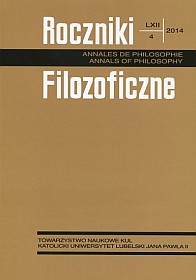God and Antirealism
Abstract
Two kinds of connections between semantic antirealism and theism may be distinguished. The first one begins with the antirealist claim that we understand language through our knowledge of justification of statements or sentences. Consequently, it becomes impossible to transfer God’s knowledge to the believer, if she or he personally doesn’t know the justification of the relevant statements. There is especially strong exposition of this doctrine in the last pages of Michael Dummett’s The Logical Basis of Metaphysics. This could be understood as the refutation of any kind of illuminationism, as well as some remotely related positions, like transcendental idealism. The second connection is more positive for theism. Antirealism needs to suppose that every statement could be known, which seems to be contrary to common sense. But there is one very easy way to make this supposition true, namely by acknowledging the existence of omniscient God, who knows every proposition. This way of thinking was first expounded by Alvin Plantinga few decades ago, and since then has become the subject of scrupulous discussions by different philosophers. It should be emphasized that after close examination these two connections aren’t equally justified, because only the first one has strong semantic roots in antirealism, why the second one is merely a speculative conjecture.
References
Brogaard B., Salerno J.: Anti-realism, Theism and the Conditional Fallacy, „Noûs” 2005, nr 39, s. 123-139.
Dummett M.: Logiczna podstawa metafizyki, przeł. W. Sady, Warszawa: Wydawnictwo Naukowe PWN 1998.
Dummett M.: Natura i przyszłość filozofii, przeł. M. Iwanicki i T. Szubka, Warszawa: IFiS PAN 2010.
Dummett M.: Thought and Reality, Oxford: Clarendon Press 2006.
Dummett M.: Truth and the Past. New York: Columbia University Press 2004.
Dummett M.: Truth, [w:] tenże, Truth and other Enigmas. London: Harvard University Press 1978, s. 1-24.
Dummett M.: What is a Theory of Meaning (II), [w:] tenże, The Seas of Language, Oxford: Clarendon Press 1993, s. 34-93.
Dummett M.: Znaczenie i uzasadnienie, przeł. T. Szubka, [w:] U.M. Żegleń (red.), Teoria znaczenia Michaela Dummetta i jej konsekwencje metafizyczny, Toruń: Dom Wydawniczy Duet 2006, s. 119-143.
Katechizm Kościoła Katolickiego, Poznań: Pallottinum 1994.
Kvanvig J.L.: The Knowability Paradox, Oxford: Clarendon Press 2008.
Moretti L.: Brogaard and Salerno on Antirealism and the Conditional Fallacy, „Philosophical Studies” 2008, nr 140, s. 229-246.
Pasnau R.: Divine Illumination, [w:] The Stanford Encyclopedia of Philosophy (Summer 2011 Edition), E.N. Zalta (ed.),
Plantinga A.: How to Be an Anti-Realist, „Proceedings and Addresses of the American Philosophical Association” 1982, nr 56, s. 47-70.
Putnam H.: Dlaczego świat nie jest wyrobem gotowym, [w:] tenże, Wiele twarzy realizmu i inne eseje, tł. A. Grobler, Warszawa: Wydawnictwo Naukowe PWN 1998, s. 225-262.
Putnam H.: Preface, [w:] tenże, Realism with a Human Face, Cambridge, Mass.: Harvard University Press 1992, s. vii-xi.
Putnam H.: Reason, Truth and History, Cambridge, Mass.: Harvard University Press 1981.
Salerno J. (ed.): New Essays on the Knowability Paradox, Oxford–New York: Oxford University Press 2009.
Salmon N.: The logic of what might have been, „Philosophical Review” 1989, nr 98, s. 3-34.
Scott M., Stevens G.: Is God an Antirealist, „American Philosophical Quarterly” 2007, nr 44, s. 383-393.
Szubka T.: Antyrealizm semantyczny, Lublin: RW KUL 2001.
Szubka T.: Putnam o epistemicznej koncepcji prawdy, [w:] D. Leszczyński (red.), Prawda, Wrocław: Wydawnictwo Uniwersytetu Wrocławskiego 2011, s. 213-223.
Tomasz z Akwinu, św.: Kwestie dyskutowane o prawdzie, t. I, przeł. A. Aduszkiewicz, L. Kuczyński, J. Ruszczyński, Kęty: Wydawnictwo Antyk 1998.
Wright C.: Truth as Sort of Epistemic: Putnam’s Peregrinations, [w:] tenże, Saving the Differences. Essays on Themes from Truth and Objectivity, Cambridge, Mass.: Harvard University Press 2003, s. 288-331.
Ziai H.: Shihab ad-Din as-Suhrawardi: Founder of the Illuminationism School, [w:] S.H. Nasr, O. Leaman (eds.), History of Islamic Philosophy, London: Routledge 1996, s. 434-464,
Ziai H.: The Illuminationist Tradition, [w:] S.H. Nasr, O. Leaman (eds.), History of Islamic Philosophy, London: Routledge 1996, s. 465-496.
Copyright (c) 2014 Roczniki Filozoficzne

This work is licensed under a Creative Commons Attribution-NonCommercial-NoDerivatives 4.0 International License.





